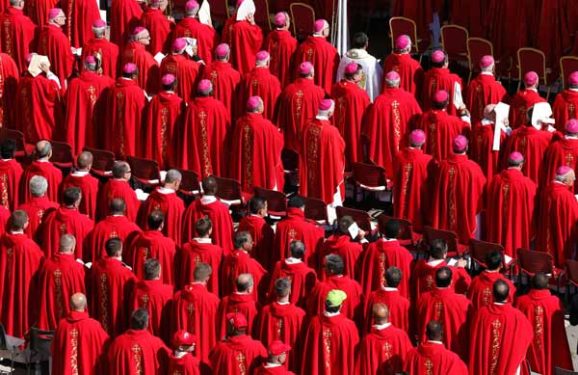
by Christopher White, The Tablet’s National Correspondent
NEW YORK – Within hours of Archbishop Carlo Maria Viganò’s blockbuster claims that Pope Francis knew about former Cardinal Theodore McCarrick’s history of abuse, the bishop of Tyler, Texas, issued a statement saying he found those claims to be credible, asking that it be read at all Masses on Sunday.
“I do not have the authority to launch such an investigation, but I will lend my voice in whatever way necessary to call for this investigation and urge that its findings demand accountability of all found to be culpable even at the highest levels of the Church,” wrote Bishop Joseph Strickland.
He went on to include the 11-page testimonial of the former papal ambassador to the United States on his diocesan website.
Range of Statements Show Divisions at Highest Levels of U.S. Church
In just over 72 hours since the Archbishop Viganò accusations came to light, a range of statements have been issued that reveal a divided U.S. Church at its highest levels.
Cardinal Blase Cupich of Chicago, Ill., named in the report for allegedly downplaying the link between gay priests and abuse, responded with a detailed statement responding to each charge, adding, “As for the rest of the ‘testimony,’ a thorough vetting of the former nuncio’s many claims is required before any assessment of their credibility can be made.”
Cardinal Donald Wuerl of Washington, D.C., also disputed the claims against him in the letter and threw his support behind the idea of an apostolic visitation to investigate how former Cardinal McCarrick’s ecclesial career advanced despite a history of abuse.
Cardinal Joseph Tobin of Newark, N.J., condemned the statement for not advancing the cause of survivors of sexual abuse, adding, “Together with Pope Francis, we are confident that scrutiny of the claims of the former nuncio will help to establish the truth.”
By Monday afternoon, a statement from Cardinal Daniel DiNardo, president of the United States Conference of Catholic Bishops (USCCB), focused on the need for investigation, saying the letter “brings particular focus and urgency” to that task.
Cardinal DiNardo, who said he would travel to Rome to meet with the pope to discuss the matter, added, “I am confident Pope Francis shares our desire for greater effectiveness and transparency in the matter of disciplining bishops. We renew our fraternal affection for the Holy Father in these difficult days.”
Yet the statement issued by the cardinal was one made on behalf of the USCCB’s executive committee, not the conference as a whole – a fact some observers have suggested may indicate that full unity within the conference doesn’t exist.
Signs of Faction
Signs of factions were evident in statements that have poured forth from other dioceses on Monday and Tuesday, which seemed to emphasize the integrity of Archbishop Viganò over that of the pope.
Bishop Robert Morlino of Madison, Wisc., while expressing solidarity with Cardinal DiNardo’s statement, directly criticized Francis for failing to provide a direct answer to the allegations in a press conference en route to Rome from his weekend trip to Ireland for the Vatican-organized World Meeting of Families.
“I must confess my disappointment that in his remarks on the return flight from Dublin to Rome, the Holy Father chose a course of ‘no comment,’ regarding any conclusions that might be drawn from Archbishop Viganò’s allegations,” he wrote. “Pope Francis further said expressly that such conclusions should be left to the ‘professional maturity’ of journalists.”
Bishop Morlino then went on to slam the credibility of journalists, saying that “in the United States and elsewhere, very little is more questionable than the professional maturity of journalists.” He specifically identified the National Catholic Reporter for what he called its bias in covering the Church.
Throughout the 1990s, the NCR was one of the first outlets to seriously cover the emerging crisis of clerical sexual abuse. That would ultimately lead to the explosive coverage of the Boston Globe’s “Spotlight” series in 2002, which prompted a national response from the U.S. bishops.
In a statement posted to social media on Monday, Bishop David Konderla of Tulsa, Okla., said that the allegations made by Archbishop Viganò “mark a good place to begin the investigations … in order to restore holiness and accountability to the leadership of the Church.”
In another statement, Bishop Thomas Olmsted of Phoenix, Ariz., said he had worked with the former nuncio for 39 years, and “I have always known and respected him as a man of truthfulness, faith and integrity.”
He went on to note that while he could not personally verify the claims by Archbishop Viganò, he asked that they be “taken seriously by all.”
‘Thorns and Sacrifices’
Outside of the United States and Rome, the majority of bishops around the world have refrained from commenting. Yet in a statement issued on Monday, the president of the Conference of Latin American Bishops (CELAM) said the papacy of Francis is “loaded with thorns and sacrifices, strengthened with the balm of grace … so that truth may shine above all sin.”
Bishop Robert McElroy of San Diego, Calif., also mentioned briefly in the Archbishop Viganò missive, issued the most strongly worded statement, condemning his brother bishops for allowing the recent allegations to divide the conference and detract from the ultimate goal of providing healing to victims.
“We as bishops cannot allow the pathway of partisanship to divide us or to divert us from the searing mission that Christ calls us to at this moment. We must make public our sinful past. We must engage and help heal the survivors of abuse. We must develop new, lay-governed instruments of oversight and investigation in every element of how we confront sexual abuse by clergy at all levels in the life of the Church,” he wrote.
“And we must reject all attempts to subordinate these goals to ideological or personal projects,” he concluded. “For if we do not, we will have betrayed the victims of abuse once again.”
